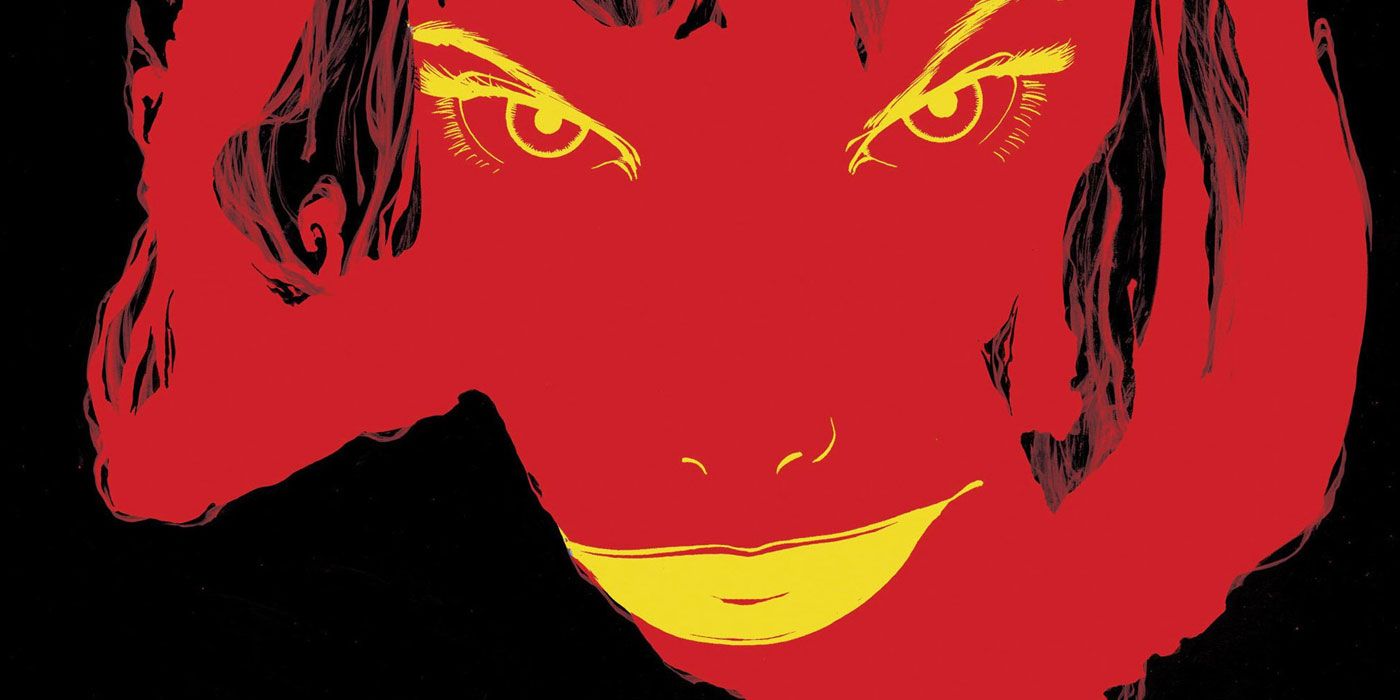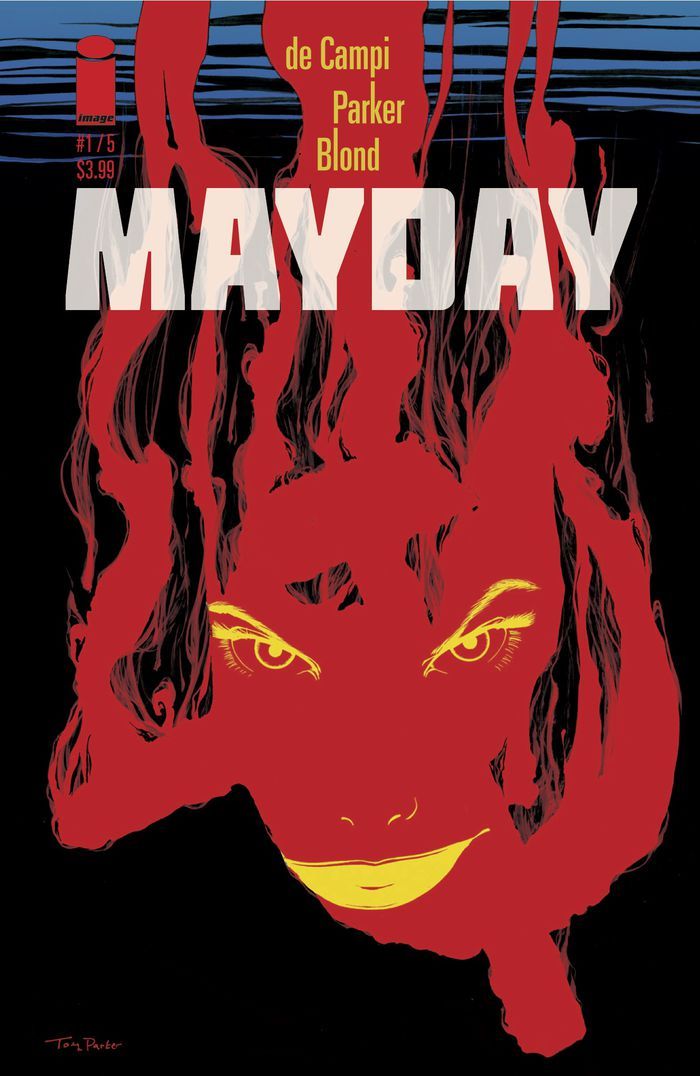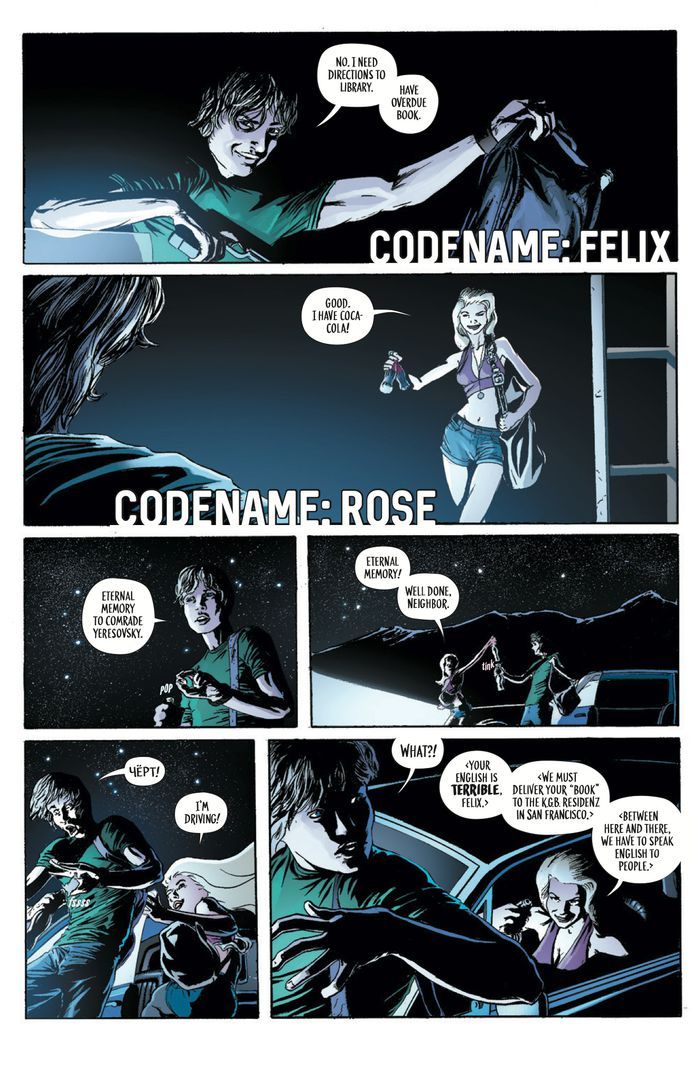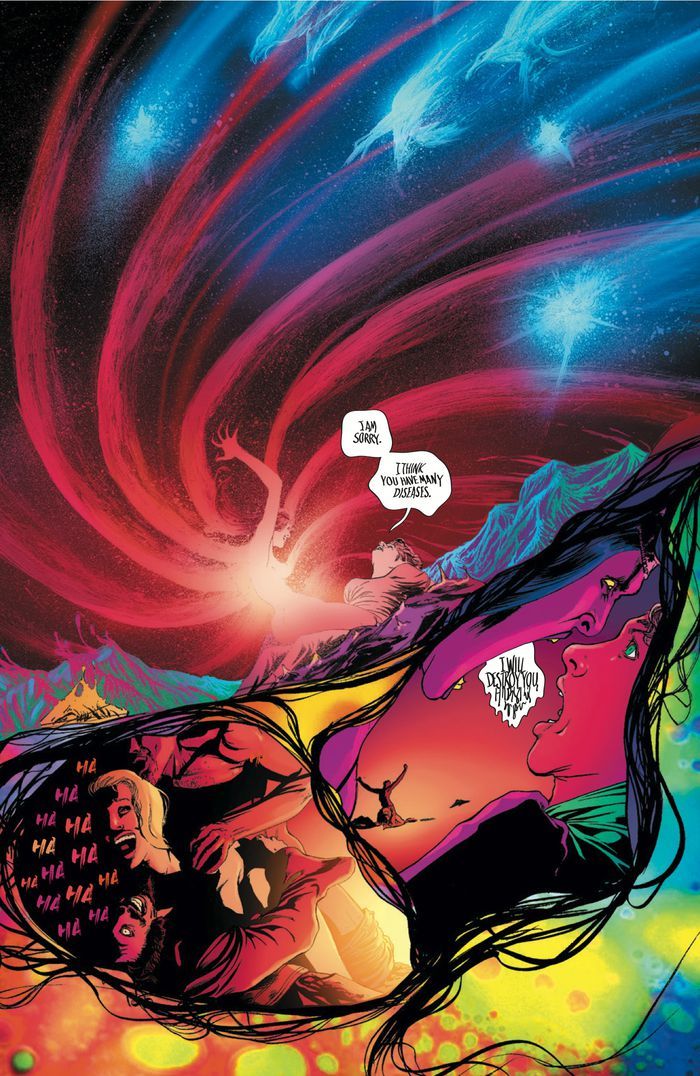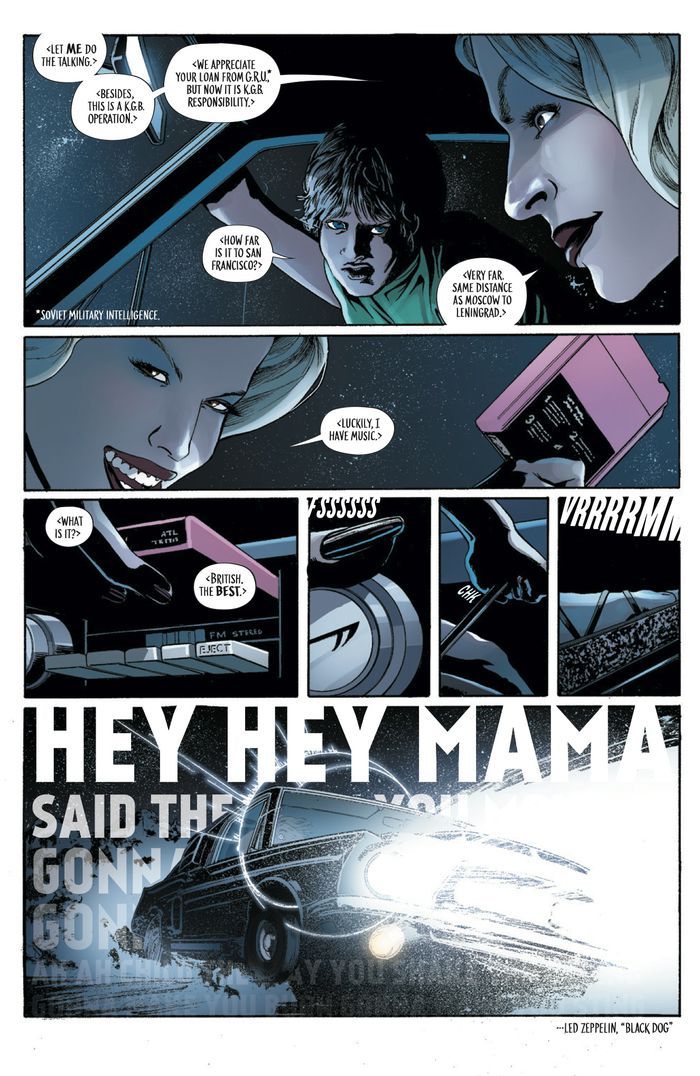In "Mayday," the only plan that comes together is the creation of writer Alex de Campi and artist Tony Parker who, along with colorist Blond, manage to create a bloody, manic depiction of 1970s espionage where it's impossible to predict what might happen next. Everybody is out for themselves, nobody can be trusted, and you just don't know when somebody is going to accidentally drink a cocktail of experimental LSD and trip out in the middle of the desert.
RELATED: De Campi & Parker’s Spy Thriller Unearths Sex, Drugs & Rock n’ Roll
The first of a planned series of 'Felix' miniseries at Image, "Mayday" is the story of two U.S.S.R. agents whose mission to recover a microfilm goes badly wrong and leads them on a rocky roadtrip through the USA, with their own people and the C.I.A. both hot on their tails. This is far from the standard spy thriller, though - in the hands of de Campi and Parker, it becomes a madcap mix of grit and gravel, punctuated by unpredictable shootouts and soundtracked by some quintessential Americana.
Ahead of the release of the trade this May, CBR spoke with de Campi and Parker about how this grand misadventure came together - and what's coming next.
CBR: You’ve come back to espionage throughout your writing career, but always with a different approach or intent for how espionage actually works. What is it that interests you so much in spycraft?
Alex de Campi: I dunno. Why did John Ford shoot a bunch of Westerns? Why did Melville make a lot of crime films? Because the more you dig into a genre, the more you realise what you can do with it. I think Westerns are an interesting comparison, as it's a genre where the best work was done after that era had already passed. The West, as mythologised by Ford and others, was long dead by the time the cameras turned. But the most effective Westerns take the concerns of the era they were filmed in, and place them in a distancing veil of history which somehow makes them more powerful, not less.
The Western is often the story of the lone wolf against an overwhelming force; the spy story can be thought of as an urban, less populist version of that. The spy is often a character of great privilege: unlimited gadgets; the ability to murder without consequence; fast cars; loose women; great suits. But, like the Western, the era of the lone spy with a gun as a lynchpin to the preservation of freedom? It's gone. James Bond is dead.
The world doesn't work that way any more. It's InfoSec and paramilitary and folks in hoodies with bombs in backpacks. It's why all the Bond films feel like such a reach now. You can't make him relevant any more. So for me, espionage is a puzzle box that I love to play with. How can i make this work? What if I do it this way? What if I take out that supporting piece, can the structure still exist? And of course once you start researching the actual history of Cold War espionage, well, you get so many ideas of things to try.
So ultimately "Mayday" is a book about terrorism, fear and alienation, and about that surety of youth where you think everything will be okay, and that you have the answers. But we've coated it in an early 1970s Cold War sugaring, to make the story sweeter.
(I've also been thinking a lot about Westerns -- eventually Chris Weston and I will do one, we've been talking about it for years, and I've found a way into that genre that makes me stupidly happy.)
The lead characters here, Felix and Rose, have different backgrounds in espionage. Felix is part of a violent, desperate world whilst Rose deals more in subterfuge and seduction. What was your process in creating/designing the characters, and then bringing them together?
Tony Parker: I started off with traditional Bond spies in suits, but was quickly educated as to the real feel for the characters. I tried to make Felix start off as that kid that wanted to look cool, but had limited resources and was emulating an idea, rather than knowing what he wanted. He wanted to look cool and American, but didn't quite know what to do. I pulled as accurate wardrobe for the time as I could, going to news photography of the era.
De Campi: The spy is always a white man in a suit. He does terrible things, but it's okay, because he's a white man in a suit working for the government. Felix is still white, but he's a foreigner, and he doesn't wear a suit, so when he kills a bunch of dudes... it's not okay. I'm with Sam Peckinpah. I don't put violence in comics for you to enjoy it. I put it in there for you to feel uncomfortable. So Felix had to be that undercurrent of brutality that we casually ignore in our spy stories. (And we had to feel every death, every injury. They had to matter, not just be the balletically violent execution of straw men for splatterfun.)
And Rose, she's my Strong Female Character. She never throws a punch; she never fires a gun. But she survives, in a uniquely feminine way. She goes which way the wind goes. And a lot of the KGB First Chief Directorate officers were from fairly privileged nomenklatura families within the Soviet Union, who went to great schools. So I wanted to show that with Rose, that she didn't have as fine a grasp on the consequences of her actions as Felix, who grew up much poorer, does.
Parker: I treated Rose as in love with the Hollywood rebel girl, and crushing hard on the Jane Fonda movie outfits, with the hard sexuality and brazen bravado. I started with the Fonda Klute hair, but going with a traditional long hair would be far more practical in the honeypot espionage game.
Throughout the series we see - and hear, thanks to your soundtrack - Americana from a range of inside and outside perspectives. Usually when a story has a young couple running through America in the 70s, they’re American. What does having them be Russian operatives change about the way you approach the setting?
De Campi: Almost everyone reading the book will be looking at 1971 America from an outside perspective. Very few readers will be old enough to remember '71. We are all foreigners in this strange land of the past, with its 8-tracks and pay phones. So having America seen through foreigners' eyes seems appropriate. It makes the cultural disconnect feel more... organic? There's going to be a disconnect anyway, so let's point at it. Besides, there's such a tradition of the "young couple on the run from the man in America" in auteur filmmaking, it was a lot of fun to change it up and make that couple to be Soviet operatives.
One of the first images of the book that came into my head was the defector, the KGB General, in this Case Study house in Palm Springs, all space and light. Let's take some characters who are used to one way of life (in the Soviet Union) and plonk them into the most different environment we can. Felix in the supermarket in San Francisco, looking at the piles and piles of oranges, was another early moment for me.
Parker: They hold themselves differently. As a couple, they're more at a theme park than a country. This land is alien to the one that they were raised in, and that they call home. Together, they cling together out of familiarity, but are amazed by the sights. They are seeing the veneer torn away, but not as people that have grown up in it. They start as only seeing the facade that they idealize, and then are shown it's reality. Separately, they fall into their training.
Felix starts on edge, and is constantly ready for a fight. As the story progresses, a young boy begins to emerge. There is a playfulness and awkwardness that occasionally pops through when there are gaps in his training. Rose walks like a ballerina, graceful and confident in public, but is emotive in private. Some of this is her, but much of it is knowing how to play on the sympathies of others.
How important is the concept of alienation, being an outsider, to the story of "Mayday"?
De Campi: It's crucial to the book. I wanted readers who had never had to exist in a place where they didn't speak the language, to know how it felt. How tiring, and how disorienting.
Parker: It's imperative. They're already on the outside trying to blend in, and society that they don't fully understand is collapsing and restructuring itself before their eyes.
How difficult is it to create a story which seems to lean in one direction - but then shifts gears so rapidly? How do you keep the readers along when the story heads off on unexpected, sometimes unexplained directions?
De Campi: It's pretty simple, actually, especially in a genre as trope-heavy as espionage. The trick is constantly to ask yourself, what would really happen? What is the weak choice, the real choice? The choice of the person who is afraid, or too confident, or trying to impress. So many stories remain in channels of convenience, running towards genre expectations.
And if you actually read about the history of Cold War espionage, things were a hot mess. Deep-cover moles, discovered years later, by accident. People getting away from arrest because the FBI agents across the street were napping. It's incredibly picaresque, not the way it's portrayed in fiction at all. And, you know, I've been in some crazy situations, and let me tell you, the absurd is always just a half step away.
Partway through the first issue, we get to experience a hallucinogenic drug trip, which feels like a definitive statement to the reader - you need to keep up with this story because it’s going to head off in some messed-up places. What prompted you to set that up in the first issue, and catch the reader off-guard so early on in the story?
De Campi: It amused me to throw actual Communists against American hippies and see what happened. And then of course to have the real drug providers being the US government. The CIA had been testing LSD on people since the early 1950s (look up MKUltra), and the West Coast FBI were hip deep in some very dodgy shit (COINTELPRO) so Stomparelli's bug juice is... not altogther a fantastical concept. All of "Mayday" is meant to throw people off balance. It was important to me early on to take everything you thought you knew about espionage stories and knock it off the table. Suits? No. New York / Berlin / London? Nah, Palm Springs. Cocktails and casinos? No, dirt and drugs and Zabriskie Point "happenings".
The story actively resists becoming a more glamorous, Bond-esque action story, even as it does offer shootouts and espionage. Was it a challenge to construct action scenes and a narrative style which is carefully composed but looks like chaotic mayhem?
Parker: Good question! That wasn't the difficult part, as that's metapanel composition. The difficulty occurred in making sure that the action scenes had a definite feel of reality and brutality, not the glamorized spy or superhero action. All of Felix's combat actions had to seem very trained and specific, with an economy of motion, with the rest of the cast varying in their action depending upon their skill levels. Some reacted well, while others flailed wildly in the chaos.
Superhero and glamorous spy action sequences have wildly dynamic shots, while those will get you hurt (or killed) in the real world. Every one of Felix's combat actions lead to a followup move, and work to keep him safe from damage. It was difficult to keep that economy of movement visually exciting, but I hope it worked.
The morality in the book is fascinating, as your presentation means readers can decide to approach the book in a number of different ways. Different people will see different protagonists, root for different characters, land on differing sides of the arguments. How did you develop the particular narrative story structure which plays throughout "Mayday"?
De Campi: I'm very interested in the common ground between classic espionage stories and what we now refer to as terrorism. The conceit of "Mayday" was very similar to Chris Morris' "Four Lions" or indeed Ken Loach's "Wind That Shakes The Barley," where I deliberately make you fall for certain characters, then have them do unforgivable things, then make you sympathize with them again. How long can you maintain support for a killer? Or a betrayer? Or a character who wishes to circumvent justice in the name of longer-range advantage?
Parker: I tried to allow the story to be itself, without keeping character staging to one character. Nearly every character has their hero moment, and I tried to keep it visually that way. If I only pushed a hero visual narrative with some of the characters, and villain visual narrative with others, it wouldn't allow for the story to develop to it's fullest ability.
The series is Coenesque in the way it leaps between life and death situations being faced on the ground, and then to the casual conversations that the spymasters have back at home between each other. How do you think the story prompts discussion about power: those who are at the top of the chain and those who are trying not to be at the bottom?
Parker: Power in many ways is an illusion. I tried to keep the humanity of all the characters, and show that each one of them has their own vested interest, and in many cases, they're making it up as they go along. Just because a character is confident, it doesn't mean that they are in control of a situation.
De Campi: The Coens have a very similar scene rhythm to me. The scene moves along, there's a significant twist, and then just as you think that's it there's another twist, catching you off balance. They also tend to inject a dark humour into things at very unexpected moments, which is also something I'm fond of doing. And I'm fascinated by stories of power, and what happens when power moves on. The work of Schiller (the great playwright of power) and the Japanese epic tales (Heike; Genji) are huge influences on me. So I'm never going to ignore the people pulling the strings. It's also about their goals, their competence, their subtext. And it's fun to chop up the rhythm.
The book sets us up for the possibility of sequels. Is that something you're actively working on, or would be interested in putting together? If so, then what would be your link between series - a character, theme, tone... or something else?
Parker: I would love to continue on, and we had a teaser in Issue #5. I don't want to say anything else, as I don't want to inadvertently spoil anything.
De Campi: I've outlined several miniseries sequels. They'll be linked by the same characters appearing in them, though each one will be a year or so ahead in time, and a different location. Next stop: Berlin, and the Baader-Meinhof Group as a proxy for toxic subcultures / fandoms. Then, the night train from Bucharest to Vienna, because I'm the sort of asshole who thinks it's a great idea to set an entire miniseries on a train.
"Mayday" will be released in trade on May 24th.

